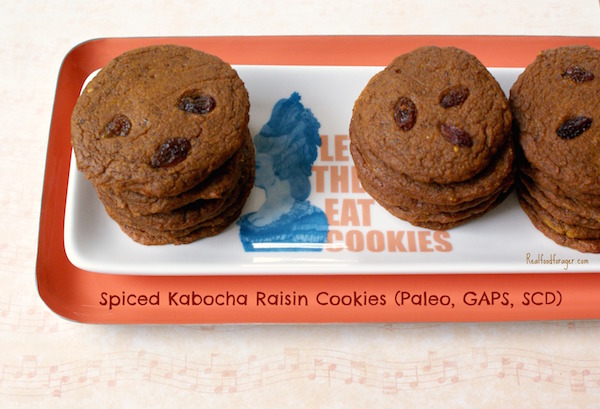As you may have noticed, I love using kabocha squash for eating and baking and this time of year they are plentiful and fun! Kabocha squash also lends itself well to grain-free cooking because it is so starchy. Many of my recipes require no flour at all when the squash is particularly starchy.
In this recipe I used a little coconut flour, but if you get a very starchy squash you may be able to make the batter without it. I added some here because the squash I cooked was not as starchy as usual.
Nutrition in Kabocha Squash
Kabocha squash has a very nice nutrition profile – grouped in with all the winter squashes like butternut squash. It is high in vitamin E (Alpha Tocopherol), thiamin, niacin, vitamin B6, folate,calcium and magnesium, and is a very good source of vitamin A, vitamin C, potassium and manganese.
The vitamin A content in vegetables is actually a measure of beta carotene, which has to be converted to vitamin A in the body. Some people have trouble converting beta carotene to vitamin A so this is not a good measure of how much vitamin A you are getting. Children also may not be good converters. It is best to get vitamin A from animal products like dairy, butter and meat, but beta carotene and all the carotinoids are excellent anti-oxidants and should be eaten for that reason.
Winter squash is a vegetable that might be especially important for us to purchase organic. Recent agricultural trials have shown that winter squash can be an effective intercrop for use in remediation of contaminated soils. Polycyclic aromatic hydrocarbons (PAHs), including pyrene, fluoranthene, chrysene, benzo(a)anthracene and benzo(a)pyrene are unwanted contaminants. PAHs are among the contaminants that can be effectively pulled up out of the soil by winter squash plants. When winter squash is planted as a food crop (as opposed to a non-food crop that is being planted between food crop seasons to help improve soil quality), the farmer’s goal is definitely not to transfer soil contaminants like PAHs up into the food. But some of that transfer seems likely to happen, given the effectiveness of winter squash in mobilizing contaminants like PAHs from the soil. For this reason, you may want to make a special point of purchasing certified organic winter squash. Soils used for the growing of in certified organic foods are far less likely to contain undesirable levels of contaminants like PAHs.
However, winter squash is number 22 (continuing after the dirty dozen) from EWG so I am not sure about how critical it is to buy organic. It can get costly when you eat a lot of it as they are heavy. But if they are contaminated I certainly do not want to eat them….
What do you think about this? Leave a comment and let me know! And let me know how you like the cookies!
The Easiest Way to Cook Winter Squash
Ingredients
- • 2 cups Kabocha squash (cooked)
- • 4 large eggs
- • 4 Tbsp ghee or butter softened (how to make ghee)
- • 4 Tbsp honey
- • 2 tsp vanilla
- 2 Tbsp coconut flour (where to buy)
- • 1/2 tsp baking soda
- • 1/2 tsp salt (where to buy salt and spices)
- • 2 tsp cinnamon
- • 1/4 tsp nutmeg
- • 1/4 tsp ginger
- • 1/2 cup chopped raisins + more for decoration
Instructions
- In the food processor process the cooked kabocha squash — it may be dry and crumbly
- Add the eggs, honey and softened ghee or butter, and vanilla and process
- Add the baking soda, coconut flour, salt and all the spices and process
- Add the raisins and process until they are evenly distributed throughout the batter and small pieces
- The batter should be thick and spoonable – if it is too watery, add some more coconut flour a level tablespoon at a time
- Drop about a half tablespoon of the batter onto the cookie sheet, using up all the batter
- You will need three cookie sheets
- Drop a few of the extra raisins onto each cookie (or you can mix them in the bowl before you drop the batter onto the cookie sheet
- Place a piece of plastic wrap over the cookies and press down with a spatula for even thickness
- Use the same plastic wrap for the next cookie sheets
- Bake at 325 degrees F for 20 – 22 minutes or until slightly browned on top
- Cool on the cookie sheet then on a rake
- Store in the refrigerator and serve at room temperature, out of the refrigerator or freeze for later
Equipment
- 3 Cookie Sheets stainless steel (where to buy)
- Spatula
- Food Processor (where to buy a food processor)














